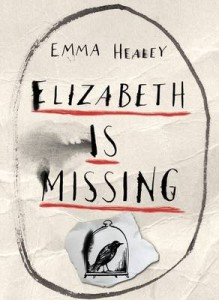 There’s been a great deal of buzz about this book, stretching as far back as the beginning of the year I seem to remember. I always think about the author when that happens. Such a whipping up of anticipation must feel like a great deal of pressure, particularly when you’re a young writer and it’s your first novel as this one is – a mixture of delight and trepidation, I imagine. All seems to be going well for Emma Healey, I’m glad to report, highly starred ratings in all the places that matter. Narrated by Maud, an 82-year-old sliding into dementia, Elizabeth is Missing has two strands – one set in the present in which Maud anxiously tries to find her dear friend Elizabeth, the other in 1946 in which her sister, married to the local spiv, has disappeared.
There’s been a great deal of buzz about this book, stretching as far back as the beginning of the year I seem to remember. I always think about the author when that happens. Such a whipping up of anticipation must feel like a great deal of pressure, particularly when you’re a young writer and it’s your first novel as this one is – a mixture of delight and trepidation, I imagine. All seems to be going well for Emma Healey, I’m glad to report, highly starred ratings in all the places that matter. Narrated by Maud, an 82-year-old sliding into dementia, Elizabeth is Missing has two strands – one set in the present in which Maud anxiously tries to find her dear friend Elizabeth, the other in 1946 in which her sister, married to the local spiv, has disappeared.
Maud has been forgetful for a little while. Her house is festooned with notes telling her not to cook, not to eat any more bread and not to go shopping. Carers attend to her basic needs, one seemingly convinced that the world’s going to hell in a handcart taking all old people with it first, and her daughter Helen visits every day. Maud frets about Elizabeth: visiting her house and finding it emptied; digging up her garden; reporting her missing to the police and placing an advertisement in the local paper. No one takes her seriously but she can’t stop worrying and remembering the events of 1946 when Sukey disappeared without trace, events clearer to her than what happened this morning. It was an odd time when women who contracted hasty war marriages frequently walked away from them, so frequently that the local paper ran a feature headlined ‘Women Come Home’. Frank, Sukey’s husband, had his finger in a number of dodgy pies. Some of his neighbours thought him a fine man, others were a little less forthcoming and three months in prison for coupon fraud didn’t improve Maud’s dad’s opinion. Then there’s Douglas, the young lodger whose house had been bombed and to whom Sukey has been kind arousing Frank’s jealousy. A woman driven mad by the death of her daughter looms particularly large in Maud’s memory. As dementia takes hold, events from the past blur into the present leaving Maud horribly confused yet determined to find Elizabeth.
It’s a brave move to write a first novel from the point of view of a demented narrator. Maud’s  narrative is often heartrending – her cupboards are overflowing with cans of peach slices, a childhood treat, she collects rubbish in the hope of finding clues and eventually fails to recognise her daughter – yet Healey neatly avoids sentimentality, injecting some much needed black humour into her writing. As Maud declines there are more gaps in the narrative, gaps which are some times a little confusing echoing her own bewilderment. Against this, the second strand stands out vividly – its resolution, when it comes, is nicely ambiguous. It’s an impressive first novel but, for me, not quite a match for Fiona McFarlane’s The Night Guest which was published earlier in the year, or Liz Jensen’s War Crimes in the Home which features the magnificent Gloria, railing against the world.
narrative is often heartrending – her cupboards are overflowing with cans of peach slices, a childhood treat, she collects rubbish in the hope of finding clues and eventually fails to recognise her daughter – yet Healey neatly avoids sentimentality, injecting some much needed black humour into her writing. As Maud declines there are more gaps in the narrative, gaps which are some times a little confusing echoing her own bewilderment. Against this, the second strand stands out vividly – its resolution, when it comes, is nicely ambiguous. It’s an impressive first novel but, for me, not quite a match for Fiona McFarlane’s The Night Guest which was published earlier in the year, or Liz Jensen’s War Crimes in the Home which features the magnificent Gloria, railing against the world.
If you want to read about how Emma Healey came to write Elizabeth is Missing JacquiWine’s Journal has an excellent account of an evening with her at Waterstones Piccadilly.


I felt much the same as you about this book. I think Still Alice did a better job
I felt that Healey managed the confusion well but Still Alice was chilling in its portrayal of decline. Thanks for reminding me of it. I may have blanked it out as Alice was about the same age as me!
Another great review, Susan. I read this at the end of last year and have been waiting impatiently – probably not as much as the author – for it to be published. Ta also for the other links. My Q&A with Emma Healey is here:
http://annegoodwin.weebly.com/emma-healey.html
Hadn’t seen your review of The Night Guest, a novel I’ve also just read and loved. Really interested in these young women tackling dementia, and doing it so well. Your post is timely for me as I’m trying to put one together on the different fictional takes on dementia.
Thanks so much, Anne. That sounds like a very interesting post. I hope you’ll include the Liz Jensen – I’m not sure if it’s still in print, although it certainly should be. Also Lisa Genova’s Still Alice which Amanda reminded me about in her comment. Chilling on early onset Alzheimer’s
I’m desperately trying to hold off from reading ‘Elizabeth is Missing’ till early July, as I want it to be fresh in my mind for our book group discussion next month! I’ll come back to you once I’ve read it.
Thanks so much for including a link to my piece on the recent event with Emma – that’s very kind of you.
You’re welcome, Jacqui, and good luck avoiding those reviews – they’re coming at you from all sides at the moment!
I have this novel on my pile – I’m glad it holds up. I have read the Liz Jensen book though and loved it – it was an early 5 star book on my blog.
Brilliant, isn’t it. Very difficult to match a character like Gloria!
Pingback: Elizabeth is Missing by Emma Healey | JacquiWine's Journal
Many thanks for the link!
Pingback: Well-worn themes | A life in books